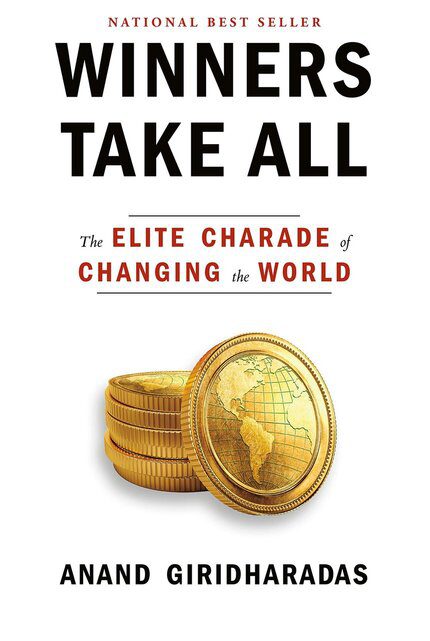Print | Kindle(eBook) | Audiobook
Former New York Times columnist Anand Giridharadas writes about the charade of changing the world pushed by a lot of the elites from antipoverty consulting firms (Technoserve, Dalberg), billionaires turned philanthropist who want to solve poverty but not economic inequality, young people trying to solve problems they don’t understand, who get flown around the world to elite networking forums such as the Aspen Ideas Festival, Clinton Global Initiative, Davos World Economic Forum. And in the process, abandoning the reason they started their initiatives in the first place.
The book offers a series of portraits of this elite-led, market-friendly, winner-safe social change.
It is difficult to get a man to understand something when his salary depends on not understanding it.—UPTON SINCLAIR
Here are my favorite takeaways from reading, Winners Take All: The Elite Charade of Changing the World by Anand Giridharadas:
Anand started asking questions about the elites approach to solving the world’s greatest problem with smoke screens like conferences, speeches, the consultants and the not for profit industrial complex. He was selected for the Henry Crown Fellow of the Aspen Institute – four one-week sessions with a group of twenty or so classmates, spread over two years, in which they would read important texts and debate them and discuss our lives and woes in secrecy, while pondering how to “make a difference.
MarketWorld
- MarketWorld is an ascendant power elite that is defined by the concurrent drives to do well and do good, to change the world while also profiting from the status quo. It consists of enlightened businesspeople and their collaborators in the worlds of charity, academia, media, government, and think tanks. It has its own thinkers, whom it calls thought leaders, its own language, and even its own territory—including a constantly shifting archipelago of conferences at which its values are reinforced and disseminated and translated into action. MarketWorld is a network and community, but it is also a culture and state of mind.
“A successful society is a progress machine. It takes in the raw material of innovations and produces broad human advancement. America’s machine is broken.”
- The biggest risk of putting a corporate consulting firm in charge of designing fixes for societal problems is that it may sideline certain fundamental questions about power. The MarketWorld problem-solver does not tend to hunt for perpetrators and is not interested in blame
The Disconnect
- American scientists make the most important discoveries in medicine and genetics and publish more biomedical research than those of any other country—but the average American’s health remains worse and slower-improving than that of peers in other rich countries, and in certain years life expectancy actually declines.
- American inventors create astonishing new ways to learn thanks to the power of video and the Internet, many of them free of charge—but the average twelfth grader tests more poorly in reading today than in 1992.
- The tools for becoming an entrepreneur appear to be more accessible than ever, for the student who learns coding online or the Uber driver—but the share of young people who own a business has fallen by two-thirds since the 1980s
- America has birthed a wildly successful online book superstore called Amazon, and another company, Google, has scanned more than twenty-five million books for public use—but illiteracy has remained stubbornly in place and the fraction of Americans who read at least one work of literature a year has dropped by almost a quarter in recent decades.
- The government has more data at its disposal and more ways of talking and listening to citizens—but only one-quarter as many people find it trustworthy as did in the tempestuous 1960s
The average pretax income of the top tenth of Americans has doubled since 1980, that of the top 1 percent has more than tripled, and that of the top 0.001 percent has risen more than sevenfold—even as the average pretax income of the bottom half of Americans has stayed almost precisely the same.
The Charade
- All around us, the winners in our highly inequitable status quo declare themselves partisans of change. They know the problem, and they want to be part of the solution. Actually, they want to lead the search for solutions. They believe that their solutions deserve to be at the forefront of social change. They may join or support movements initiated by ordinary people looking to fix aspects of their society. More often, though, these elites start initiatives of their own, taking on social change as though it were just another stock in their portfolio or corporation to restructure. Because they are in charge of these attempts at social change, the attempts naturally reflect their biases.
- The initiatives mostly aren’t democratic, nor do they reflect collective problem-solving or universal solutions. Rather, they favor the use of the private sector and its charitable spoils, the market way of looking at things, and the bypassing of government. They reflect a highly influential view that the winners of an unjust status quo—and the tools and mentalities and values that helped them win—are the secret to redressing the injustices. Those at greatest risk of being resented in an age of inequality are thereby recast as our saviors from an age of inequality.
Elite networking forums
- Elite networking forums like the Aspen Institute and the Clinton Global Initiative groom the rich to be self-appointed leaders of social change, taking on the problems people like them have been instrumental in creating or sustaining. A new breed of community-minded so-called B Corporations has been born, reflecting a faith that more enlightened corporate self-interest—rather than, say, public regulation—is the surest guarantor of the public welfare.
The only thing better than controlling money and power is to control the efforts to question the distribution of money and power. The only thing better than being a fox is being a fox asked to watch over hens.
- It is possible, but unlikely. For whoever treats a disease recasts it—with their own diagnosis, prescription, and prognosis. To take on a problem is to make it your own, and to gain the right to decide what it is not and how it doesn’t need to be solved. The problem of human want, for example, had found very different solutions when it passed from the care of feudal lords to that of republics giving representation to property-holding men to that of democracies with universal adult suffrage.
Win Win
- Adam Smith tells the rich man to focus on running his business on the assumption that positive social consequences will occur automatically, as a happy by-product of his selfishness. Through the magic of the “free market”—an oxymoron ever since the first regulation was imposed on it—he unwittingly arranges for the common good.
- The new win-win-ism was built on the same assumption of harmony in the interests of the winners and the losers, the rich and the poor, but it rejected the idea of social good as a by-product, a spillover. The winners of commerce were no longer told to ignore the social good and keep their contribution to it indirect and unintentional. They were to focus on social improvement directly and intentionally.
Wealth is like an orchard. You have to share the fruit, not the orchard.—CARLOS SLIM
The Summits
- The idea of doing well for yourself by doing good for others is a gospel, one that is celebrated and reevangelized at an unending chain of tent revivals around the world. The citizens of MarketWorld can reinforce the mission at conference after conference:
Davos, TED, Sun Valley, Aspen, Bilderberg, Dialog, South by Southwest, Burning Man, TechCrunch Disrupt, the Consumer Electronics Show, and now, at Summit at Sea, on a cruise ship full of entrepreneurs wishing to change the world.
- As America’s level of inequality spread to ever more unmanageable levels, these MarketWorld winners might have helped out. Looking within their own communities would have told them what they needed to know. Doing everything to reduce their tax burdens, even when legal, stands in contradiction with their claims to do well by doing good. Diverting the public’s attention from an issue like offshore banking worsens the big problems, even as these MarketWorlders shower attention on niche causes.
Thought leaders can find themselves becoming like poets speaking a tax collector’s language, saying what they might not say or believe on their own. And the danger isn’t only in what they say in this new language, but also in the possibility that they might somewhere down the line stop thinking in their native one.
All the Best in your quest to get better. Don’t Settle: Live with Passion.



1 Comment
Pingback: 100 Books Reading Challenge 2020 – Lanre Dahunsi